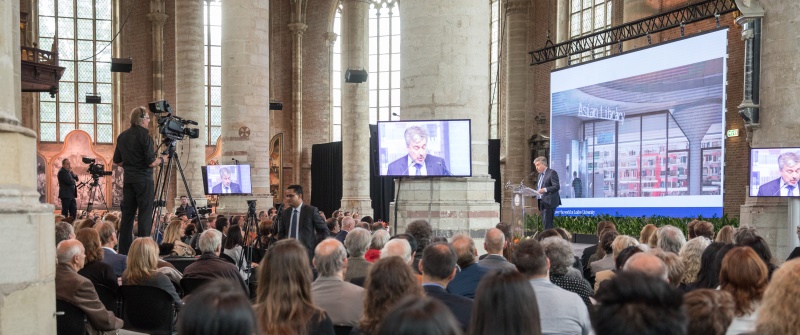
25 Sep Blog: Make Leiden great again. We have the Asian Library….
By Marieke Bloembergen
I had a dream. Last week, there was a big party in Leiden’s cathedral, the Pieterskerk. There, an international community of esteemed scholars and enlightened visitors had flocked together to celebrate the event of the year – no, of the last 450 years. It was the opening of Leiden University’s Asian Library. I saw beautiful Balinese dance and music, I saw an elegant and engaged queen, I heard speeches, I heard today’s greatest scholar of Asian history – no, of world history. The speakers were all men, and all white. They talked of cosmopolitan histories of harmonious exchange and collaboration between the great white scholar-adventurers and between the great learned institutions of Leiden’s great past. Thanks to those men and those institutions we had this great Asian Library. I heard the world would get access to this great, great library, in real or in digitized form. It was all great.
And then I saw a new book! It was presented to the queen as commemoration of the 450 years of meticulous study, collecting, and writing that had made Leiden’s Asian Library, Leiden’s University, and Leiden’s other Asia-focused institutes – KITLV, IIAS, the Siebold House, the Ethnographic Museum – and thus, Leiden, great again. What better title could have been chosen for the new book than this one: A voyage of discovery.
I had a dream . . .
A voyage…? A discovery…? Was this, indeed, a dream? The party transformed into a colonial spectacle that only the Rijksmuseum seems to have been able to trump. Yes, that’s a deliberate word choice. For, hadn’t we learned at another party, the great exhibition of 2015 ‘Asia in Amsterdam. The culture of luxury in the Golden Age’, that Asia actually made Amsterdam great again? Like the new book presented last week, that Rijksmuseum exhibition begun with the journey of the Dutch ships that, in 1595, left for Java, marking the start of the wonderful discovery of the wonder that is Asia – but those journeys had made Amsterdam, not Leiden, great again. Great Dutch journalists of the most critical Dutch dailies only marvelled at the –indeed– beautiful objects and wonders gathered together and put on display in Amsterdam. No one seemed to see the problem.
Signs of hope
It’s true that historian-curators at the Rijksmuseum have been trying to engage with issues in Dutch colonial history. They have been re-exploring their collections, recognizing colonized subjects in the art contained with the museum’s walls, and (re) assessing what it means to have this booty at all. They have begun to try to show what was wrong and do right. And it’s also true, and a relief, that at least some of the articles in A voyage of discovery emphatically start from where this actually messy and not so triumphalist history of how collections are formed has to start, too: in Asia. That is necessary, if we want to understand what it means that the Rijksmuseum or the Asia Library or whatever other institution in the Netherlands (or elsewhere) is in possession of them – in short, to understand what these collections are about beyond ourselves.
The blind eye of the beholder
The problem with the parties in Leiden and Amsterdam was not even that the entire colonial context was ignored, that the exchanges being lauded were often predicated upon uneven relationships, or even that war and structural violence went hand-in-hand with the acquisition of the collections. No, the issue is that no one in Leiden – or Amsterdam – even thought of asking where is Asian agency – either past or present in all of this. And no one seems to have wondered how – and with whom – can we highlight this Asian agency at our parties. This glaring absence is an embarrassment. It is bizarre, too. There are several on-going collaborative research projects in Leiden, some of which were initiated in Asia. Why didn’t we hear about them? Why not start the party, and the retelling of the great Asian library’s history, from the perspective of the book-, paper- and pencil-makers, of the storytellers, translators and informants? Or why not from the perspective of the booty? And, why not, by the voice of a scholar from Asia? Basically, tell us anything, but tell us from Asia. Anything that helps opening up our view on the world. Anything less is doing that world, the objects, the collections, and the histories a grave disservice.
(Marieke Bloembergen is a cultural historian and senior researcher at KITLV. Her research interests concern the political dynamics of knowledge production, policing and heritage practices in colonial and postcolonial Indonesia, as understood in their local, inter-Asian and global dimensions.)
Photo: Monique Shaw / Leiden University




No Comments